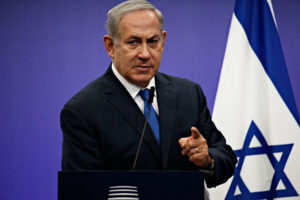- About Us
- Policy Center
- Learn
- Press Room
- Blog
- Get Involved
- Donate
- Donate to J Street Online
- Make a Gift in Someone’s Honor or Memory
- Make a Monthly Gift
- Tax-Deductible Donations
- Giving by mail
J Street has called on President Biden to outline a clear pathway toward US recognition of a demilitarized Palestinian state as the centerpiece of a comprehensive regional peace initiative. This would be aimed at both bringing the Israeli-Palestinian conflict to an end and fully integrating Israel as a full, respected and legitimate regional power.
This pathway would include a set of criteria that Palestinian representatives must meet and agree to. They should be clear and achievable, and designed to ensure a sustainable outcome that guarantees Israel’s security, advances broader regional normalization between Israel and its Arab neighbors, and delivers freedom, safety, and self-determination to the Palestinian people.
We believe that the United States must show Israelis, Palestinians and others in the region that major world powers are serious enough about a two-state solution to pursue it – even against the wishes of Israel’s current right-wing government.
A pathway to peaceful recognition will aim to disempower Hamas, aid in the fight against extremism and reduce the levels of despair and disenfranchisement upon which extremists feed.
View the full, in-depth proposal here.

While we do not know how the current Israel-Hamas war will end, we do know that the horror and trauma will only repeat itself for future generations of Israelis and Palestinians unless we change course.
We need bold leadership to jumpstart a major comprehensive push to resolve the underlying conflict. As President Biden has said, we cannot return to the status quo before October 7.
We are also in a moment in which Israeli Prime Minister Benjamin Netanyahu has repeatedly and openly bragged of his success in thwarting a two-state solution – and reaffirmed his opposition to recognition of a two-state solution. As Arab powers in the region have made clear, including Saudi Arabia, further progress for Israel’s integration in the region cannot occur without recognition of Palestinian statehood.
Against this backdrop, we believe the best way to move toward a better future of peace, safety and freedom for all is through a comprehensive regional peace agreement with recognition at its core. This is a position supported by many US allies, including the UK, which has called for “irreversible progress” toward a two-state solution.
It delivers the necessary incentives to bring all parties to the table – including Palestinian leadership, which must be pressed to make essential reforms – and will no longer give Prime Minister Netanyahu a veto over a solution that would boost Israel’s security and regional legitimacy.
It’s clear that defeating terror and extremism are in the interests of both Israelis and Palestinians – and that includes defeating Hamas.
The fight against Hamas, however, is not just a military fight – it’s a political and ideological battle as well.
Decades of “managing” the conflict rather than solving it have led to relentless bloodshed and loss of life on both sides. In the absence of leadership toward a better future, extremism, retaliation and violence have filled the void.
Outlining an achievable, peaceful path to statehood offers a clear alternative to violent struggle and terrorism, which Hamas advocates. An alternate path – with real, achievable gains – will empower moderates, disempower extremists and combat the disenfranchisement and hopelessness upon which terror thrives.
No people should be asked to tolerate indefinite statelessness, military occupation and the erosion of hopes and freedoms – and this proposal provides an alternative path to securing the Palestinian people’s legitimate aspirations of peace, freedom, self-determination and equality.
The offer of meaningful statehood also incentivizes Palestinian leaders to make necessary democratic and security reforms and should include clear safeguards for Israeli security, including the commitment to the enforcement of demilitarization of the future Palestinian state. Criteria for recognition should be designed to ensure the path is sustainable, that it is politically achievable, and that it delivers real gains, including greater freedom, rights and safety to all.

Before October 7, Prime Minister Netanyahu pursued a disastrous policy of weakening Palestinian moderates and bolstering Hamas to thwart prospects for Palestinian statehood. He continues to brag about his success in blocking a two-state solution.
Prime Minister Netanyahu’s repeated objections to statehood are one of the reasons why this new path is so urgent and why the United States must signal its willingness to recognize Palestinian statehood.
While the Israeli government should have a voice in this process, it should not have a veto over the United States’ decision to join over 135 other countries in recognizing Palestinian statehood.
Previous Prime Ministers and former Israeli security officials have signaled the importance of a two-state solution as key to ensuring Israel’s long-term security and legitimacy in the region.
For recognition to be successful and sustainable, it absolutely must be more than symbolism. There must be real incentives for Palestinians to engage in this process, and there must be tangible benefits for commitments and agreements to be sustained.
That’s why we believe recognition should be part of a broader, comprehensive, multilateral initiative and should articulate immediate and tangible benefits for the Palestinian people.
This should include US diplomatic engagement, full recognition in international fora, significant levels of foreign investment, greater freedom of trade and exports, and freedom of movement and travel. It should be accompanied by a clear commitment by global powers to end the occupation of Palestinian territory and support the fair resolution of final status issues in direct negotiations.
The Netanyahu government – led by a Prime Minister who has boasted of thwarting a two-state solution and supported by pro-settlement, pro-annexation ministers – opposes any step toward recognition of a Palestinian state.
They have – along with allies like AIPAC – argued that recognition would “reward” terror, even though US recognition would entirely sideline Hamas and be conditional on demilitarization, security reforms and an ironclad guarantee for Israel’s security. Numerous security experts, including former Israeli Prime Ministers, continue to reject this position, arguing that a two-state solution is essential for Israel’s long-term future as a safe, democratic homeland for the Jewish people.
Both the Netanyahu government and AIPAC continue to support regional normalization efforts, including recognition by Arab states in the region, such as Saudi Arabia. Such states have made clear, however, that Palestinian statehood is now a threshold issue for further progress.
Recent polling indicates that despite the Israeli public’s further shift to the right in reaction to the October 7 attack, a majority of Israelis would support a US-supported package agreement that includes the return of the hostages, normalization with Saudi Arabia, and a stipulation that the Palestinian state would be demilitarized. Given the goodwill President Biden has earned with the Israeli people, he is in the best possible position to present the Israeli public with this pivotal choice.
The overwhelming majority of Jewish Americans support a two-state solution as a means of delivering freedom and self-determination to the Palestinian people and securing Israel’s future as a safe, proud, democratic homeland for the Jewish people. Prime Minister Netanyahu, for his part, remains underwater in polling of American Jews.
J Street understands that many within our community may have concerns and reservations about a new pathway to ending the Israeli-Palestinian conflict, and we’re committed to ongoing dialogue, discussion and engagement to ease concerns and build support both here in the United States and with our friends and partners in Israel.
If you have any further questions or feedback, please don’t hesitate to reach out to a J Street contact in your area or on your campus, or to email us at [email protected]. You can also find our Policy Center FAQ here.